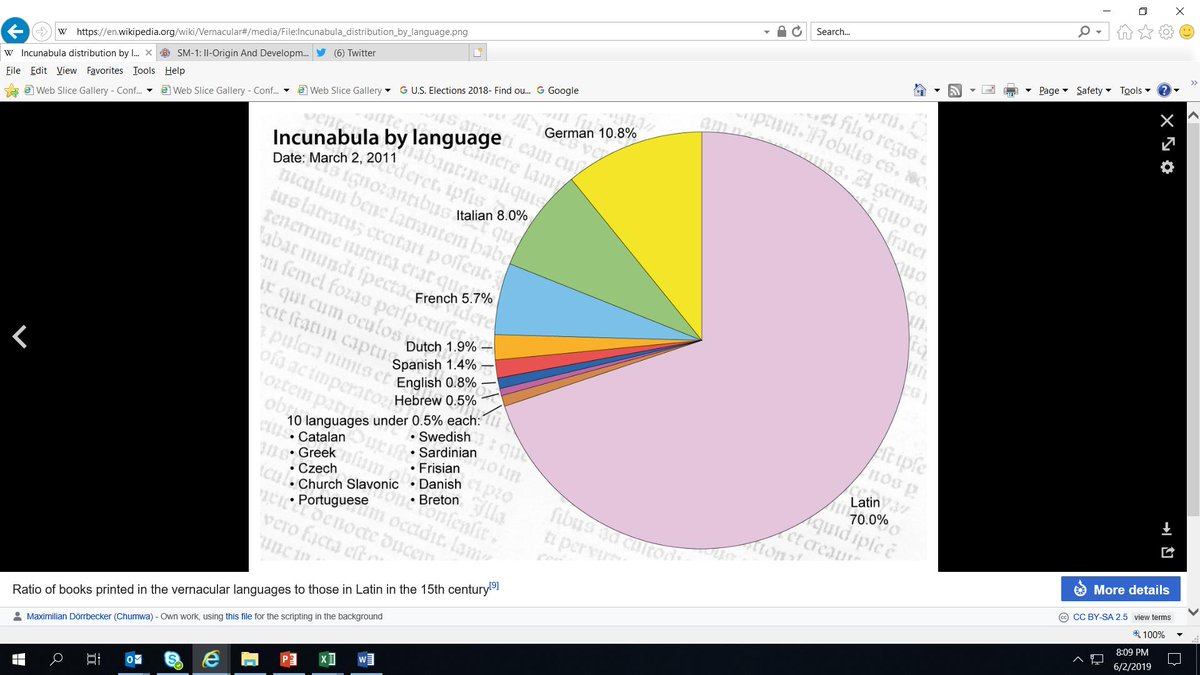But amidst the language squabbles, we tend to reflect less on the root cause of all this
The rise of the Vernacular. A relatively recent phenomenon in Indian history
There was some Prakrit literature yes
And yes, considerable literature in some of the older Southern languages - Tamil/Kannada, but for the most part Vernaculars had a position secondary to Sanskrit
Vernaculars reigned at home, and in common speech. Yet in an age of limited literacy, they never competed with Sanskrit for "prestige"
Francis Bacon, a contemporary of Shakespeare, wrote chiefly in Latin.
So did Descartes
So did Isaac Newton, few decades later
He lived a good half a century after the age of Shakespeare in the 17th century
Yet even at that very late date, the language he preferred to write his "Principia Mathematica" in was Latin.
Not English.
And I presume his readers in mainland Europe preferred the Latin version. Not English.
As already discussed, the reign of Sanskrit and the secondary status of vernacular was not an Indian anomaly. It was consistent with the state of affairs in Europe
All his works without exception were authored in Sanskrit
Yet Shri Ramanuja wrote ALL his work in Sanskrit. There is not a single work of his in Tamil that survives
It very much existed. Perhaps a little more so down South which had already seen the flowering of Bhakti literature in the Tamil country long before that date
But nevertheless the dominant language for literary expression was v much Sanskrit
Not in the Prakrit tongues
Not in Kannada or Maharashtrian Prakrit
But there was no sense of insecurity about the Prakrit tongues. Sanskrit's status was not grudged
हरियाणए देसे असंखगाम, गामियण जणि अणवरथ काम|परचक्क विहट्टणु सिरिसंघट्टणु, जो सुरव इणा परिगणियं|रिउ रुहिरावट्टणु बिउलु पवट्टणु, ढिल्ली नामेण जि भणियं|
"There are countless villages in Haryana country. The villagers there work hard. They don't accept domination of others, and are experts in making the blood of their enemies flow. Indra himself praises this country. The capital of this country is Dhilli"
Because Prakrit is not meant to be standardized. It is meant to change with time
Unlike Latin works of say a Cicero or a Thomas Aquinas, or the Sanskrit works of Kalidasa or Vedanta Desika, which speak for eternity, having been authored in a "prestige" low entropy language
The works of the supposedly populist Gaudiya Sampradaya in 16th century Bengal , were in Sanskrit. Be it Jiva Goswami or Rupe Goswami
Not in Bengali
Yet the works of that age that speak to us the most are the theological treatises of Madhva men like Vyasatirtha, and Vadiraja
They didn't write in Telugu. Or Kannada.
But in Sanskrit
(be it Sanskrit in India or Latin in Europe)
So it is not as though the ascendance of Vernacular is a 1000 year story
But rather a 200-300 year one
The Holy Roman Empire reigned supreme over much of mainland Europe.
And what suffered was the notion of a united Christendom. Something that was v much within the realm of reality even as late as 1500 CE
The rise of the vernacular is inextricably linked to the urge to be accessible, to be popular, to be democratic
Something that had not been attempted on that scale till then in Northern India.
And it very much stemmed from this urge to reach out.
It witnessed the decline of the classical language (Sanskrit), and the big big boom in vernacular literature
It was the age of UV Swaminatha Aiyar, the age of Bharatenduh, the age of Premchand
In Tamil Nadu, it was perhaps the Central Tamil dialect of the Tanjore region
In the North, it was the language spoken in and around Delhi - the Khariboli dialect
They sought to be bounded by grammars (though Vernacular grammars do predate 19th century in many cases).
They sought to attain "prestige"
Unlike in the past when they were content playing second fiddle to Sanskrit
I am not sure.
What have we gained by the Vernacular revolution?
A difficult politically incorrect question that ought to be asked
So the function played by the Vernacular in the main is to fan regional passions
Sanskrit remains. We call it English now
Premchand
Kuvempu
Kalki
One can go on..
To be honest, I don't think so
The costs have outweighed the benefits
Hey...vernaculars enable better instruction to kids.
In their Mother tongue...
Oh yes, the Mother tongue angle, which is impressed upon us so v often
The people who run this country are the ones who learnt their trade in Sanskrit (i.e. English) :)
Vernaculars exist to cater to regional vanity
Vernaculars cannot compete with it.
But yes, they can definitely help break the Indian nation. That's one thing the vernaculars can succeed at
Just got reminded of a point that helps drive home how vernacular limits one's intellectual appeal
Let's take two mathematical texts -
(Contd..)
Jyeshtadeva's Yuktibhasa (16th cen)- authored in Malayalam - v limited appeal, almost grossly neglected until past few decades
The language sort of influenced the relative appeal of the two books



